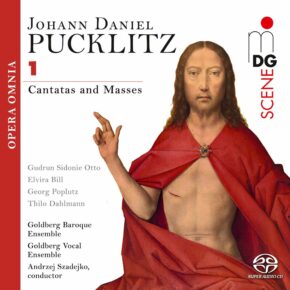Johann Daniel Pucklitz hat seine musikalische Karriere in Danzig gemacht – als Sänger und Instrumentalist an der Marienkapelle, als Musiker des Stadtrates und zudem als Kellermeister. Sein Leben, seine Musik bleiben noch größtenteils zu entdecken, und diese neue Produktion leistet in diesem Zusammenhang einen wichtigen Beitrag.
Obwohl noch weitgehend der Barockmusik verpflichtet, zeichnen sich Pucklitz’ Kompositionen durch ihre Originalität aus, durch spannende Harmonien und oft unerwartete Wendungen.
Dieser eigenen Musiksprache werden die Interpretationen von Messen und Kantaten vollauf gerecht. Das Solistenquartett zeichnet sich durch eine textnahe Rhetorik aus, setzt auf stimmliche Natürlichkeit und freie Entfaltung der musikalischen Linien. Dem schließen sich das Goldberg Ensemble und der Chor mit feiner und federnder Musikalität an. Leider kommt durch das matte Klangbild der Aufnahme der stellenweise Festton, der immer wieder aufblitzende barocke Glanz von Pucklitz’ Musik dadurch nicht voll zur Geltung.
Johann Daniel Pucklitz made his musical career in Gdansk – as a singer and instrumentalist at St. Mary’s Chapel, as a musician for the city council and also as a cellar master. His life and his music still largely remain to be discovered, and this new production makes an important contribution in this context.
Although still largely indebted to baroque music, Pucklitz’s compositions are characterized by their originality, exciting harmonies and often unexpected twists and turns.
The interpretations of masses and cantatas do full justice to this unique musical language. The quartet of soloists is characterized by a rhetoric close to the text, relying on vocal naturalness and free development of the musical lines. The Goldberg Ensemble and the choir join in with fine and bouncy musicality. Unfortunately, the matte sound of the recording means that the festive tones and baroque splendor of Pucklitz’s music, which reappear intermittently, are not fully realized.



















